In Science Salon # 124 Michael Shermer speaks with David J. Halperin about what our fascination with UFOs tells us about ourselves as individuals, as a culture, and as a species.
Tags
-
browse by topic
religion
eSkeptic for July 14, 2020
Evolution & Creationism, Part 1
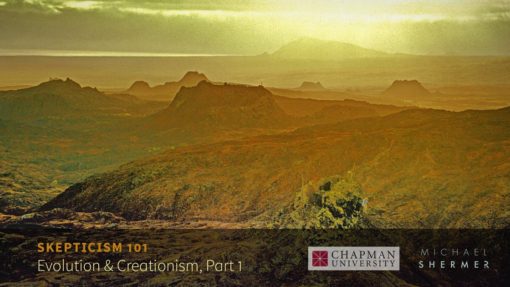
In this lecture on Evolution and Creationism (Part 1), Dr. Michael Shermer takes viewers to the Galápagos Islands to retrace Darwin’s footsteps and show that, in fact, Darwin did not discover natural selection when he was there in September of 1835. He worked out his theory when he returned home, and Shermer shows exactly how Darwin did that, along with the story of the theory’s co-discoverer, Alfred Russel Wallace.
eSkeptic for May 29, 2020
In this lecture on Evolution and Creationism (Part 1), Dr. Michael Shermer takes viewers to the Galápagos Islands to retrace Darwin’s footsteps and show that, in fact, Darwin did not discover natural selection when he was there in September of 1835. He worked out his theory when he returned home, and Shermer shows exactly how Darwin did that, along with the story of the theory’s co-discoverer, Alfred Russel Wallace.
Ann Druyan — Cosmos: Possible Worlds
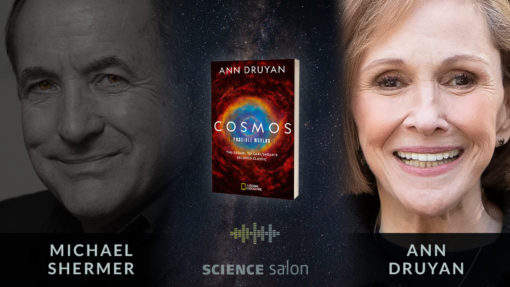
In this sequel to Carl Sagan’s beloved classic and the companion to the hit television series hosted by Neil deGrasse Tyson, the primary author of all the scripts for both this season and the previous season of Cosmos, Ann Druyan explores how science and civilization grew up together. From the emergence of life at deep-sea vents to solar-powered starships sailing through the galaxy, from the Big Bang to the intricacies of intelligence in many life forms…
eSkeptic for April 21, 2020
In Science Salon # 112 Michael Shermer speaks with Ann Druyan about her book Cosmos: Possible Worlds, exploring how science and civilization grew up together. This book is the sequel to Carl Sagan‘s beloved classic and the companion to the hit television series hosted by Neil deGrasse Tyson.
Cults, Myths, and Religion
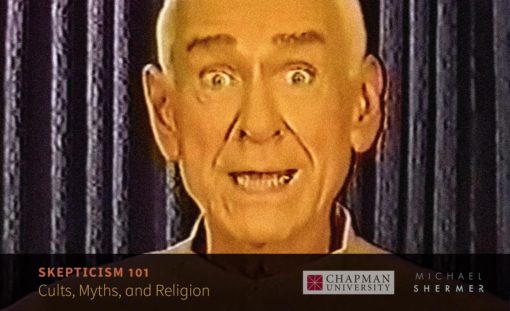
Dr. Michael Shermer considers the characteristics of cults, how they differ from sects, religions, and myths, the role that myths and religions play in culture and people’s lives, and what Scientologists really believe.
eSkeptic for April 3, 2020
Dr. Michael Shermer considers the characteristics of cults, how they differ from sects, religions, and myths, the role that myths and religions play in culture and people’s lives, and what Scientologists really believe.
Brian Greene — Until the End of Time: Mind, Matter, and Our Search for Meaning in an Evolving Universe
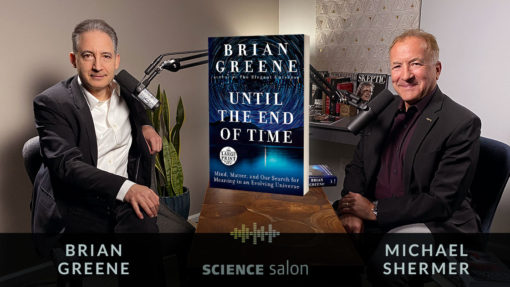
Until the End of Time is Brian Greene’s breathtaking new exploration of the cosmos and our quest to find meaning in the face of this vast expanse. Greene takes us on a journey from the big bang to the end of time, exploring how lasting structures formed, how life and mind emerged, and how we grapple with our existence through narrative, myth, religion, creative expression, science, the quest for truth, and a deep longing for the eternal.
eSkeptic for March 17, 2020
In Science Salon # 108 Michael Shermer speaks with Brian Greene about his book Until the End of Time: Mind, Matter, and Our Search for Meaning in an Evolving Universe. PLUS, during the Coronavirus outbreak, while many schools are closed, Shermer shares one of his Chapman University lectures, taught remotely, free for everyone to view.
Diana Pasulka — American Cosmic: UFOs, Religion, Technology
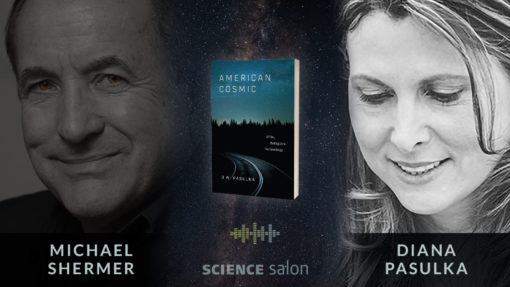
More than half of American adults and more than 75 percent of young Americans believe in intelligent extraterrestrial life. This level of belief rivals that of belief in God. In Science Salon # 105 Michael Shermer speaks with Diana Pasulka about her book: American Cosmic: UFOs, Religion, Technology.
eSkeptic for February 25, 2020
In Science Salon # 105 Michael Shermer speaks with Diana Pasulka about her book: American Cosmic: UFOs, Religion, Technology. PLUS an excerpt from How to Have Impossible Conversations: A Very Practical Guide provides some tools to help people navigate contentious conversations.
Hugo Mercier — Not Born Yesterday: The Science of Who We Trust and What We Believe
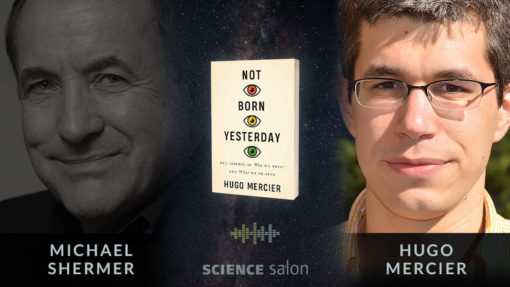
Not Born Yesterday explains how we decide who we can trust and what we should believe — and argues that we’re pretty good at making these decisions. Hugo Mercier demonstrates how virtually all attempts at mass persuasion — whether by religious leaders, politicians, or advertisers — fail miserably.
eSkeptic for January 28, 2020
In Science Salon # 101 Michael Shermer speaks with Hugo Mercier about his new book: Not Born Yesterday: The Science of Who We Trust and What We Believe.
Amber Scorah — Leaving the Witness: Exiting a Religion and Finding a Life
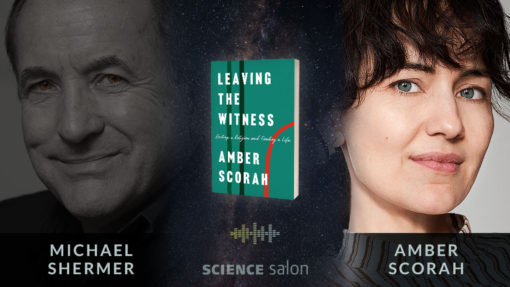
In this revealing conversation Amber Scorah opens the box into the psychology of religious belief to show how, exactly, religions and cults convince members that theirs is the one true religion. A coming of age story of a woman already in her thirties, this unforgettable memoir examines what it’s like to start one’s life over again with an entirely new identity.
eSkeptic for December 31, 2019

In Science Salon # 97 Michael Shermer speaks with former Jehovah’s Witness Amber Scorah about the psychology of religious belief and her new book Leaving the Witness: Exiting a Religion and Finding a Life. PLUS Peter Kassan reviews Artificial Intelligence: A Guide for Thinking Humans by Melanie Mitchell.
Melvin Konner — Believers: Faith in Human Nature
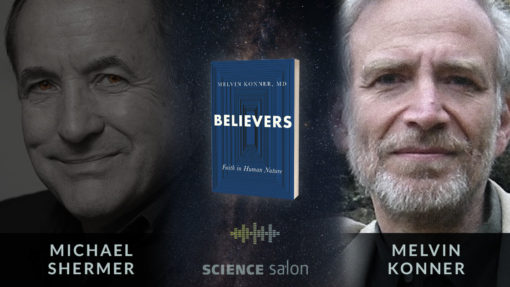
Shermer and Konner discuss: Konner’s experience living among hunter-gatherers • how hunter-gatherers conceive of religion vs. modern peoples • the “Big Gods” theory of religion • the “God Module” • why faith is not for everyone • the rise of the nones, but why religion will never completely die out • the upside of religion, and more…
eSkeptic for November 5, 2019
In Science Salon # 90 Michael Shermer speaks with world renowned biological anthropologist Mel Konner who examines the nature of human nature, including (and especially) in his new book on the nature of religiosity. PLUS: In an article originally published in Quillette on Halloween, October 31, 2019, Dr. Shermer argues that patternicity, agenticity, pessimism, the negativity bias, and the Second Law of Thermodynamics provides a deeper explanation for why conspiracy theories are so popular and enduring. The article is based…
eSkeptic for October 29, 2019
In Science Salon # 89 Michael Shermer speaks with Richard Dawkins about his new book Outgrowing God. Dawkins explains how the natural world arose without a designer and challenges head-on some of the most basic assumptions made by the world’s religions. PLUS: Is the statement “We are living in a post-truth world” true? If your answer is “yes” then the answer is “no” because you’ve just evaluated the statement in an evidentiary manner, so evidence still matters and facts still…
Richard Dawkins — Outgrowing God: A Beginner’s Guide
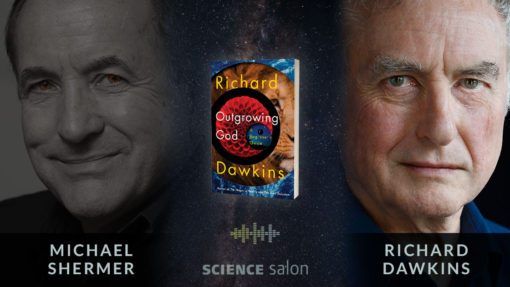
Richard Dawkins explains how the natural world arose without a designer — the improbability and beauty of the “bottom-up programming” that engineers an embryo or a flock of starlings — and challenges head-on some of the most basic assumptions made by the world’s religions.
eSkeptic for June 12, 2019
In this issue: The latest issue of Skeptic magazine (24.2) launches today in print and digital editions; PLUS Science Salon # 70 with cosmologist and inventor of the BICEP (Background Imaging of Cosmic Extragalactic Polarization) experiment Dr. Brian Keating.
SKEPTIC App
Whether at home or on the go, the SKEPTIC App is the easiest way to read your favorite articles. Within the app, users can purchase the current issue and back issues. Download the app today and get a 30-day free trial subscription.










